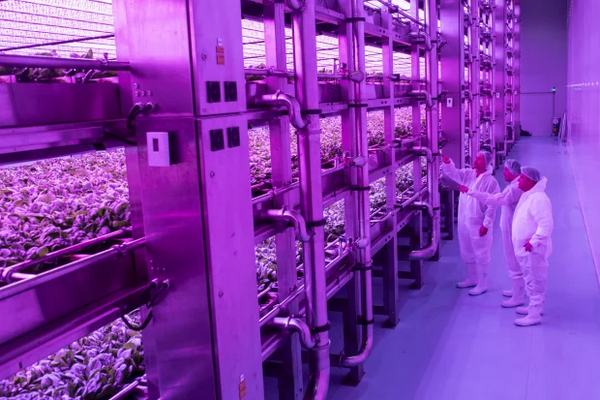A Gold Coast-based vertical farming start-up backed by Tribeca Investment Partners and one of Australia's wealthiest families hopes to counter investor cynicism about robotic foods with its new $150 million automated veggie patch.
Stacked Farm says it has learned from the failures of its billionaire-backed rivals which have struggled to stay afloat after attracting Silicon Valley interest in the 2021 venture capital bubble.
The home-grown business has developed a system to operate vertical indoor farms that use robots to plant, harvest, and bag herbs and microgreens with no human intervention. It began with a 400-square-meter R&D set-up in Burleigh Heads in 2017 and upgraded to a 2100sq m operational farm up the road in Arundel four years later.
Since its first harvest in early 2024, Stacked Farm has produced several tonnes of leafy greens and herbs each week that are destined for fast food and casual diners such as Grill'd, Fishbowl, and Nandos.
 © Russell ShakespeareRussell Shakespeare
© Russell ShakespeareRussell Shakespeare
It has now secured planning approvals and $150 million in debt and equity financing to build a 10,000sq m farm in north-west Melbourne which will produce 3.4 million kilograms of greens each year with just 15 staff. The company declined to disclose the split between the debt and equity, nor Stacked Farm's valuation.
A portion of the new investment comes from an existing investor, US-based Magnetar Capital. The business has also attracted backing from Tribeca Investment Partners and Tayside Investments Australia, the office of the family behind PFD Food Services, which was sold to Woolworths in 2020.
Vertical farming involves growing crops indoors in stacked layers, and requires vastly less water than regular farming, being self-contained and less vulnerable to fires, floods, and droughts.
In November, Bowery Farming, once valued at $US2.3 billion ($3.7 billion) and backed by Silicon Valley VCs and celebrities such as Justin Timberlake, halted its operations, while vertical farming predecessors like AeroFarms, Kalera, and AppHarvest have sought bankruptcy protection.
The Jeff Bezos-backed vertical farming start-up Plenty Unlimited is also struggling to raise fresh capital. Bloomberg reported last week that the group, which raised almost $US1 billion from investors including the Amazon billionaire and SoftBank, is in talks to raise new money at 90 percent below its pandemic-era valuation. In December, it shut down its leafy vegetable factory in California to pivot to strawberries.
Sam Canavan, Stacked Farm's chief operating officer, said high operating costs, including buying expensive off-the-shelf robotics and hiring hundreds of high-salaried horticulturalists, scientists and engineers had saddled many VC bets with unsustainable models.
"Businesses got out over their skis and grew too quickly by opening farms at a rapid pace because they had the very deep pockets of the likes of SoftBank backing them," Mr Canavan said.
"We think the second or third mouse gets the cheese, so we are going to hang back, see what they are doing, and learn from their mistakes."
Stacked Farm has 50 staff in its Gold Coast head office and expects to operate the Melbourne site with just 15 including farm operators, horticulturists, and technical maintenance engineers when it is fully operational in mid-2026.
Its chief executive Conrad Smith said the company has moved slower than its rivals, developing its own proprietary robotics.
"The vertical farming industry has seen a few fallen operators in recent times," Mr Smith said. "We've invested crucial time and resources early in planning, iterating, and research and development to ensure a viable business model with data-driven decision-making at the forefront."
Mr Canavan said Stacked Farm can produce herbs such as rocket, basil, coriander, and parsley at the same price or cheaper than traditional farms, with a much smaller environmental footprint and a longer shelf life.
It is also in advanced discussions to open more farms at home and overseas.
Source: Australian Financial Review










